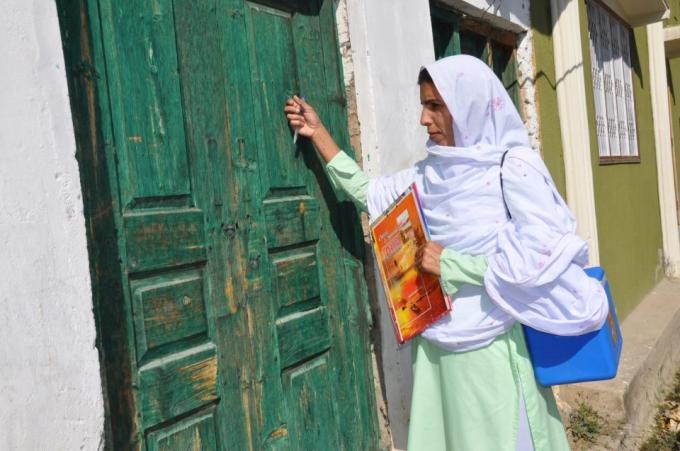
LHWs are playing an important role in providing family planning services, particularly to the poor women

The role of Lady Health Workers (LHWs), a lower cadre aimed at working on reproductive health in Pakistan, has gradually changed from giving advice on family planning to other primary healthcare (PHC) issues.
According to the Journal of Pakistan Medical Association (JPMA), in Pakistan, each LHW serves a population of 1,000 people in the community whom she visits once a month. She covers all aspects of maternal, newborn and child healthcare.
About 60 per cent of the total population of Pakistan, mostly rural, is covered by the programme with more than 90,000 LHWs all over the country. Earlier working under the federal health ministry, they are now employed by the National Programme for Family Planning & Primary Health Care after the devolution under the 18th Amendment in 2010.
The LHWs are educated and work in their own communities. They are paid, trained, and supervised. A trained LHW can provide all basic healthcare facilities to her own community. Supervisors are appointed to supervise the work of LHWs. Their salary per month is about Rs10,000.
Currently, Basic Health Unit (BHU) and Rural Health Centre (RHC) have one LHW each to cater to primary health needs while Lady Health Visitors (LHVs) with special training course from nursing institutes are also functioning at the local level.
"They target women in rural areas, and that is why there is a need to improvise their training courses, and strengthen their role in a systematic way," says Kashif Mukhtar Abid, district population officer in Nankana, district Punjab. "Many of them work in family planning and welfare centres under the population department and guide women about family planning, use of contraceptives and methodologies."
Read also: "Millions are unable to do family planning due to informational and service gaps"
A government official points to poor services as key factor that affect LHW programme, such as unavailability of the required material at times and the inability to retain staff lead to more problems.
A few of the main tasks of LHWs are: to organise the community by forming women groups and health committees; act as liaison between formal health system and community, register all eligible couples (married women aged 15-49 years), disseminate health education message on hygiene and sanitation, provide contraceptives to eligible couples, coordinate with traditional birth attendants (TBAs) and local health facilities; undertake nutritional interventions, such as anemia control, growth monitoring, and emphasise on breast-feeding.
They also coordinate with Extended Programme of Immunisation (EPI) for immunisation of mothers against tetanus and children against six immunisable diseases; and carry out prevention and treatment of minor ailments.
Attiya Inayatullah, former federal minister for population control, having a long association with the Family Planning Association of Pakistan, says LHWs were introduced in Pakistan in the mid 1990s in Benazir Bhutto’s regime. Their primary focus was on working on reproductive health as "Family Planning Health Worker."
She says they had 75 per cent role in family planning besides focusing on mother and child health and immunisation. Later, this model was highly appreciated by international organisations. The Oxford Group did research on this cadre in Pakistan. Later, after some years, the number of LHWs was increased in the country to gradually bring it from 45,000 to 100,000 and use them at the grassroot level.
"Gradually, respective governments started using these LHWs for all primary health needs and family planning remained no priority. Moreover, another trained cadre of community midwives was also introduced," she says, urging the need to effectively use all these lower cadres with focus on family planning and primary reproductive health at the local level.
A study by the United States Agency for International Development (USAID), conducted a few years ago, termed family planning as a major assignment for the LHWs. The report says that by 2008 use of family planning was nearly twice as high in areas accessed by LHWs than those not covered by them.
The study concludes that LHWs play an important role in providing family planning services, particularly to the poor women. "There appear to be no mechanisms to ensure that LHWs ask women about their family planning needs or to ensure women for long term or permanent methods. And since the primary goal of the LHW programme is family planning, it should be given more score on performance. There is a need to ensure that remuneration to LHWs and their supplies of family planning commodities remain uninterrupted," the study suggests.